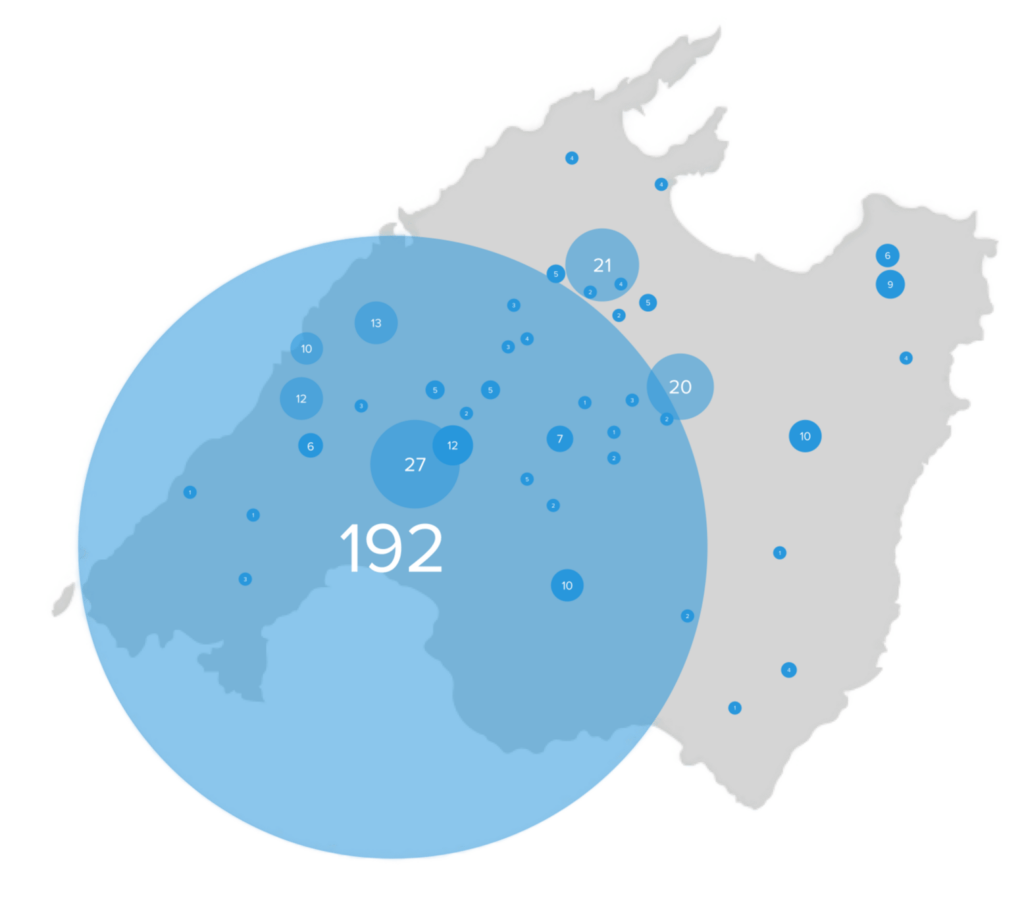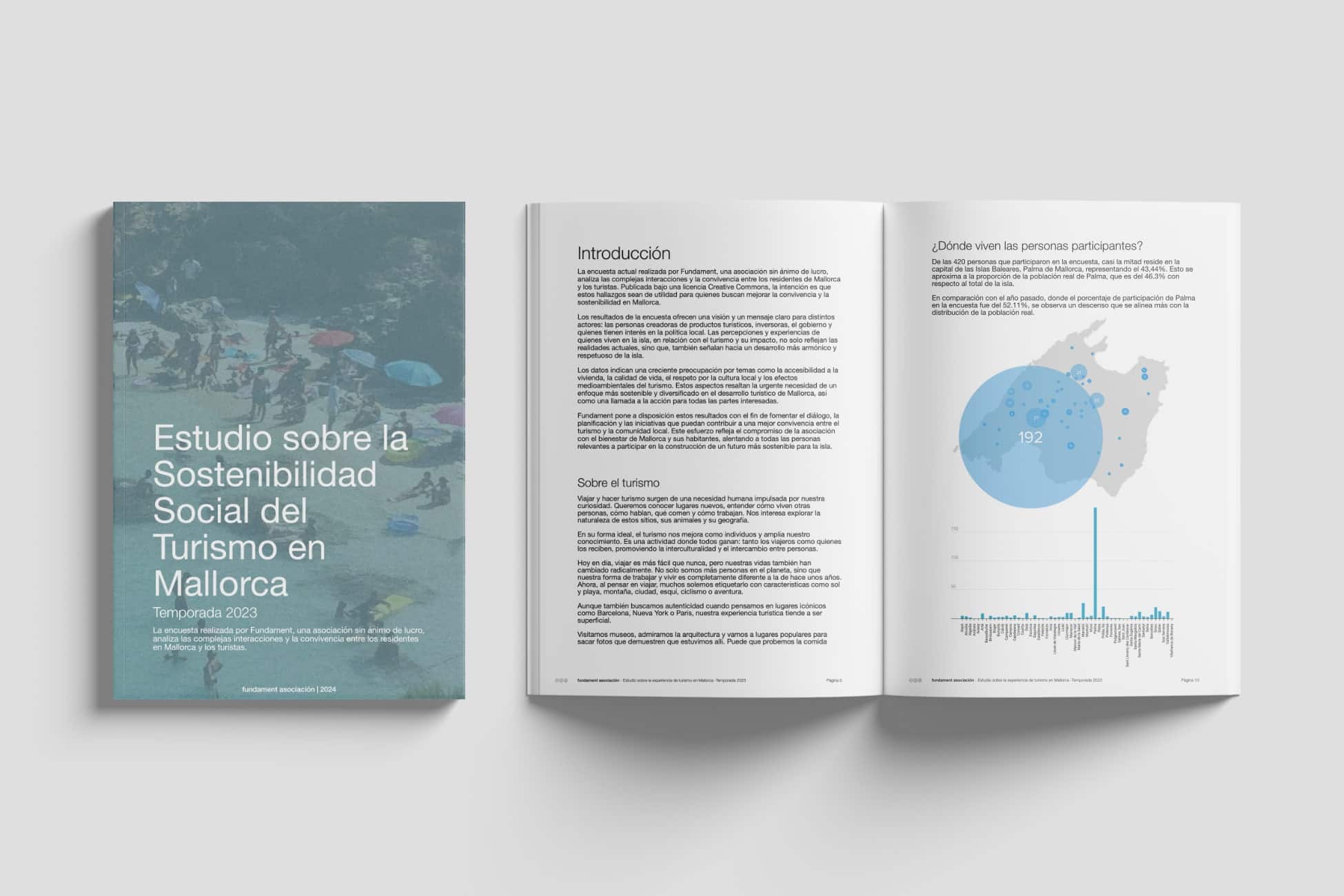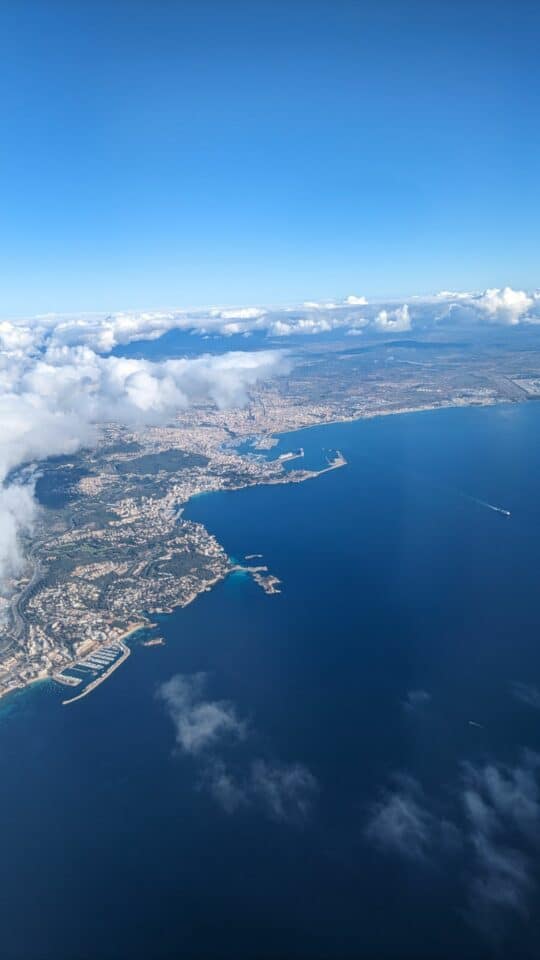Our current survey on the 2023 season analyzes the complex interactions and coexistence between Mallorca residents and tourists.
Published under a Creative Commons license, these findings are intended to be useful to those seeking to improve coexistence and sustainability in Mallorca.
Podcast: Who should take responsibility for tourism’s impact in Mallorca?
Welcome to this episode, where we explore the collateral effects of tourism in Mallorca and discuss who should be held accountable. Join us as we dive into the results of our 2023 survey and hear the perspectives of local residents on how tourism shapes their daily lives and environment.
Context
The relationship between the inhabitants of Mallorca and tourism, an omnipresent element on the island, is an ongoing situation of adaptation and confrontation.
The Fundament study has gathered the voices of the local community to better understand this interaction, reflected in a dataset that ranges from the daily life affected by the flow of visitors to considerations about the sustainability of an economy heavily reliant on a single industry.
Mallorca Situation
Mallorca has experienced exponential growth in visitors and residents with the development of the tourism industry, making it particularly interesting to analyze demographic changes to illustrate this transformation.
1968
300,000 residents 600,000 tourists
3 tourists / resident
2023
940,471 residents
12,463,388 tourists
13.3 tourists / resident
Total data of tourists and demographics from Ibestat
Comparing with other places affected by tourism
Although other places have similar issues related to tourism, we have chosen these for comparison because their situation is particularly revealing in terms of coexistence with tourists.
Barcelona
1,620,000 residents
9,390,000 tourists
5.8 tourists / resident
Berlin
3,770,000 residents
13,000,000 tourists
3.4 tourists / resident
Venice
260,000 residents
25,000,000 tourists
96 tourists / resident
* based on 2019 data
Tourism doesn’t just affect people who live in a ‘tourist destination’*, it has collateral effects that are not accounted for in the benefits tourism might bring.
*This term doesn’t help explain to residents that they must coexist with what is. So, what is a ‘tourist destination’?
By nature, these places don’t exist; they are artificial and created to generate profits for those who exploit them.
The collateral effects are numerous, starting with the saturation of humans in one place, measured by the HPI (Human Pressure Index), which records how many people are in Mallorca at any given time, including both residents and visitors. From the year 2000 to 2023, it has increased by 39%*, considering the increase in residents.
As a result of this density, other effects arise, such as the saturation of infrastructure, scarcity of natural resources like water and food, and even pollution of the sea and air, such as air pollution.
* Data from Ibestat, Annual maximum and minimum values of demographic load.
In the year 2023, approximately more than…

10 million
Tourists
in about

61 thousand
Planes
…to the Island of Mallorca, which hosts the third-largest airport in Spain, despite having only 940,471 residents.
Total data of tourists and demographics according to Ibestat & Statista: total tourists, excluding cruise passengers (=10,735,907 tourists), divided by an average occupancy (175 passengers) of the most frequent type of aircraft at PMI (=61,348 planes).
Results of our survey:
How do Mallorca residents experience tourism?
We have achieved significant participation from residents of nearly all towns on the island.
To provide reliable estimates of the opinions of Mallorca residents regarding tourism, the survey captured the responses of 420 people residing in 44 different municipalities. This allows us to address the perspectives of an approximate population of 940,471 island inhabitants, with a confidence level of 95% and a margin of error of +/- 5%.
Thus, we can affirm that the results obtained are a valid and reliable reflection of the general view of the population living in Mallorca about the impact of tourism on their daily lives.
We have conducted
420
Surveys
We have achieved participation from
44
Municipalities

We asked how tourism in Mallorca is experienced from the perspective of Mallorca’s population
It is noteworthy that even people who depend on tourism have a clear opinion about its effects on daily life.
96 %
(+9% compared
to the 2022 study)
of all respondents say tourism has a major environmental impact.
81 %
(+37% compared
to the 2022 study)
of respondents who depend directly or indirectly on tourism say they sometimes think they would live better with less tourism.
81 %
of respondents believe that tourism in Mallorca does not respect and value the local culture.
72 %
(+10% compared
to the 2022 study)
of respondents have had problems accessing housing due to vacation rentals.
More data in the survey report at the bottom of the page.
Who is responsible for the unintended effects of tourism in Mallorca?
The responses to this question reveal a call for responsibility regarding the collateral effects of tourism in Mallorca, with the predominant idea being that both the government and tourism companies should be the primary managers.
There is a strong belief that authorities should implement stricter regulations and effective policies, while tourism companies should assume a significant share of responsibility due to the economic benefits they gain.
Who should take responsibility for the collateral effects of tourism in Mallorca?
Some data on who should take responsibility for the collateral damage of tourism
40 %
of respondents believe that the tourism industry should take responsibility for the negative effects of tourism.
33 %
of respondents believe the responsibility should be shared between the tourism industry and the government to address the negative effects of tourism.
26 %
of respondents believe it is the government's responsibility to take charge of the negative effects of tourism.
More data in the survey report at the bottom of the page.
What will the future be like?
In the analysis of this year's responses, there is once again a clear conviction of change towards a more sustainable model that respects both the environment and the local culture and society.
Most respondents highlight the need for tourism to prioritize quality over quantity.
They add that reducing the number of visitors, limiting environmental impact, and promoting good practices that benefit both residents and tourists can be starting points to achieve this goal.
How should tourism be in 2030 in Mallorca?
Some data advances on how participants believe tourism will be in 2030 from their perspective
60 %
of respondents believe that tourism will decrease and be regulated by 2030.
56 %
of respondents believe that by 2030 tourism will be sustainable, respectful, and environmentally friendly.
23%
of respondents desire quality tourism for 2030. However, it remains unclear whether this refers to quality in terms of purchasing power or a broader concept of quality.
More data in the survey report at the bottom of the page.


